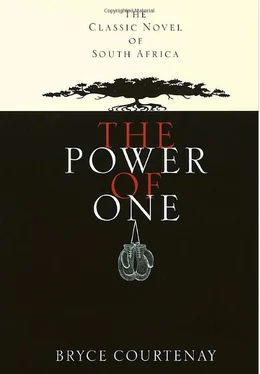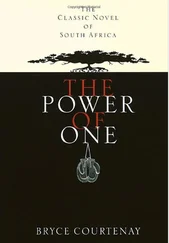Брайс Куртенэ - The Power of One
Здесь есть возможность читать онлайн «Брайс Куртенэ - The Power of One» весь текст электронной книги совершенно бесплатно (целиком полную версию без сокращений). В некоторых случаях можно слушать аудио, скачать через торрент в формате fb2 и присутствует краткое содержание. Жанр: Современная проза, на английском языке. Описание произведения, (предисловие) а так же отзывы посетителей доступны на портале библиотеки ЛибКат.
- Название:The Power of One
- Автор:
- Жанр:
- Год:неизвестен
- ISBN:нет данных
- Рейтинг книги:3 / 5. Голосов: 1
-
Избранное:Добавить в избранное
- Отзывы:
-
Ваша оценка:
- 60
- 1
- 2
- 3
- 4
- 5
The Power of One: краткое содержание, описание и аннотация
Предлагаем к чтению аннотацию, описание, краткое содержание или предисловие (зависит от того, что написал сам автор книги «The Power of One»). Если вы не нашли необходимую информацию о книге — напишите в комментариях, мы постараемся отыскать её.
The book is made to movie with the same name.
The Power of One — читать онлайн бесплатно полную книгу (весь текст) целиком
Ниже представлен текст книги, разбитый по страницам. Система сохранения места последней прочитанной страницы, позволяет с удобством читать онлайн бесплатно книгу «The Power of One», без необходимости каждый раз заново искать на чём Вы остановились. Поставьте закладку, и сможете в любой момент перейти на страницу, на которой закончили чтение.
Интервал:
Закладка:
Doc took out his bandanna and blew his nose. ‘You are goot friend, Peekay.’ He gave one of his old chuckles and rubbed a hand through my hair and then examined one of my hands. My kneecaps and hands were dirty from weeding between the cactus. ‘Better wash in the tank if you are going to be my partner, we must look our best. Ja, this is true, the audience has been waiting sixteen years.’ He rose and took me by the hand. ‘Come, Peekay, we go now.’
On the journey into town Doc and I sat in the front of the van with Lieutenant Smit. Klipkop drove the truck while Gert sat in the back of the van. The Steinway had been loaded onto the flat-top and roped. Even so, five prisoners were arranged around it to hold it firmly in place on pain of death, while one sat with Doc’s piano stool between his legs.
About half a mile from the market square the Diamond T stopped and the two warders herded the six blacks off the truck. One of them climbed back on while the other started to march the prisoners out of town towards the prison. We entered the top of Crown Street about three hundred yards from the market square. The main street was deserted, as quiet as a Sunday afternoon. ‘Jesus Christ, I hope this doesn’t backfire on the Kommandant,’ Lieutenant Smit said, almost as though speaking to himself. We had been travelling behind the truck and now we moved ahead of it. I noticed all the shops were closed, even Goodhead’s Bottle Store and the Savoy Café which never closed for lunch. We turned the corner into the square and my mouth dropped open.
The market square was packed with hundreds of people who had started to cheer as they saw us. A warder signalled us to a space which had been kept clear under a large flamboyant tree. Lieutenant Smit told Gert to stay with the van but not to show his rifle. Then he jumped out, and walking in front of the Diamond T he guided it into a roped-off section in the centre of the square.
Several warders scrambled up a stepladder onto the flat-top and untied the ropes securing the Steinway. One placed Doc’s piano stool in place while another, an electrician from the prison, rigged up a microphone.
The moment we saw the crowd, Doc began to shake. I was half sitting on his knee and I could feel him quivering. ‘Peekay, did you do what I said about the water flask?’ he asked in a tight voice.
‘It is in the piano stool, Doc.’
‘Peekay, you must take it and when I ask, you must hand it to me, you understand?’ I nodded.
When we drew to a halt under the large flamboyant tree the Kommandant was waiting for us. He opened the van door and Doc got out, very unsteady on his feet.
Kommandant Van Zyl took him by the elbow and held him firmly. ‘Now then, Professor, remember you are a German, a member of a glorious fighting race. We of the South African Prison Service are on your side, you must show these Rooineks what is real culture, man!’
Doc looked round fearfully to see if I was by his side. ‘Do not forget the flask, Peekay,’ he said. We walked to the centre of the square, Doc holding tightly onto my hand and being steadied by the Kommandant.
The excitement of the crowd could be felt around us. Nothing like this had happened on a dull Monday since war was declared. We reached the flat-top to find that some twenty rows of chairs had been placed behind the ropes on either side of it. The chairs must have come out of the shops and offices, for no two matched, but they formed a ringside audience of the best people in town. Mrs Boxall was in the front row. She was dressed in her best hat and gloves as were most of the other town matrons considered of social rank. At the back end of the lorry, in three rows of identical chairs, sat the prison warders and their wives, the men in uniform and the women wearing their Sunday best. It was obvious they were very pleased with themselves.
Doc had pulled himself together a little by the time we reached the truck and he and I climbed the stepladder onto the flat-top without assistance.
The Kommandant, helped up by Klipkop, climbed the stepladder onto the flat-top. Klipkop then walked over to the microphone. ‘Testing one, two three, four,’ his voice boomed from the four corners of the market square. Satisfied, he climbed down again to join Lieutenant Smit on the ground. The Kommandant moved over and stood in front of the microphone.
‘ Dames en Here , ladies and gentlemen,’ he began. But from then on he spoke in English. ‘As you all know from reading the newspaper, there has been a very big fuss made about one of our most distinguished citizens, Professor Karl Von Vollensteen, a professor of music from across the seas. The good professor, who has lived in this town for fifteen years and has taught many of your young daughters to play the peeano, was born in Germany. It is for this alone that he is being put under my custody.’ Several pockets of people in the crowd had started to boo and someone shouted, ‘Once a Jerry, always a Jerry!’ which brought about a little spasmodic laughter and clapping. The Kommandant held up his hand. ‘I am a Boer, not a Britisher. We Boers know what it is like to be robbed of our rights!’
Considerably more booing started and the same voice in the crowd shouted, ‘Put a sock in it, Jaapie!’
The Kommandant, as though replying to the heckler, continued. ‘No, it is true, I must say it, you took our freedom and now you are taking the professor’s!’
This time the booing started in earnest and suddenly Mr O’Grady-Smith, the mayor, stood up and shouted up at the Kommandant, ‘Get on with it, man, or we’ll have a riot.’
The Kommandant turned angrily on the mayor, oblivious of the microphone in front of him. ‘Don’t you blêrrie tell me to get on with it! Jes because you the mayor of this dorp you think you can boss people around, hey?’
The booing stopped, for Mr O’Grady-Smith was no more popular than the Kommandant. He was also a very fat man and at least ten inches shorter than the Kommandant. He strode from his seat, and with the help of a couple of town councillors mounted the stepladder and walked over to the microphone. Standing on tiptoes he shouted into the loudspeaker, ‘It’s high time we moved the jail and the nest of Nazis who run it out of Barberton. This town is loyal to King George and the British Empire. God save the King!’
Most of the crowd clapped and cheered and whistled and Mr O’Grady-Smith turned and looked up at the Kommandant, a smug, self-righteous expression on his face.
From where I stood next to Doc on the flat-top I could see about a dozen men making their way through the crowd towards us. ‘Some men are coming,’ I said to Lieutenant Smit, who was now standing beside the stepladder with Klipkop to discourage any further townsfolk from emulating the mayor. They quickly mounted the flat-top, pulled up the ladder and placed the microphone next to the Steinway so that the bottom half of the flat-top was clear. Without any ceremony, the mayor and the Kommandant were hastily pushed to the top end to stand beside the seated Doc and me.
There was a good ten feet between the truck and the first row of seats behind the ropes. This was to allow the more important citizens a clear view of Doc at the piano. The attackers crossed this strip of no man’s land and swarmed onto the back of the flat-top. Lieutenant Smit and Klipkop held the high ground which evened things out considerably while the other warders took the clearing between the lorry and the seats. The flat-top and the apron around it were filled with fighting men and the screams of the ladies as they tried to back away from the brawl. The Kommandant ventured out from behind the Steinway and received a punch on the nose. Fat Mr O’Grady-Smith was crouched on all fours halfway under the piano, trying to look invisible.
Читать дальшеИнтервал:
Закладка:
Похожие книги на «The Power of One»
Представляем Вашему вниманию похожие книги на «The Power of One» списком для выбора. Мы отобрали схожую по названию и смыслу литературу в надежде предоставить читателям больше вариантов отыскать новые, интересные, ещё непрочитанные произведения.
Обсуждение, отзывы о книге «The Power of One» и просто собственные мнения читателей. Оставьте ваши комментарии, напишите, что Вы думаете о произведении, его смысле или главных героях. Укажите что конкретно понравилось, а что нет, и почему Вы так считаете.












